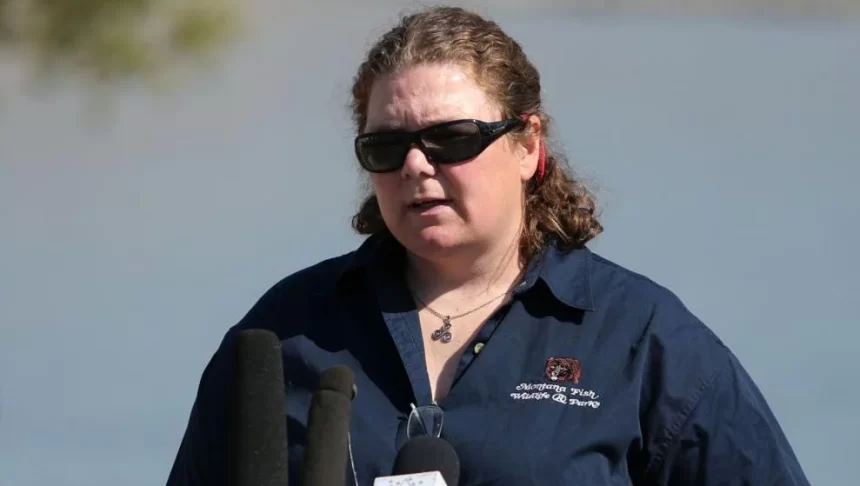After a nearly 21-year career with Montana Fish, Wildlife and Parks, the agency’s lead fisheries expert has resigned. Eileen Ryce, a fisheries biologist with a PhD, said inadequate support from her superiors while she ran a division that touches on two areas of critical interest in Montana — water and wildlife management — led her to resign.
In a letter dated Aug. 1, 2024, Ryce briefly referenced what she called “baseless allegations” that purportedly motivated department leaders to put Ryce on administrative leave three months ago.
“Being verbally threatened with immediate termination and escorted from the office within view of the public and staff was an egregious action,” she wrote. “Had the Directors Office taken due diligence and investigated the erroneous allegations prior to taking action against me, the damaging results of these actions would have been avoided.”
In an Aug. 2 conversation with Montana Free Press, Ryce said the May 17 events came as a “shock” to her and that she was kept in the dark about the circumstances surrounding them until a few days ago, when an investigator told her that allegations of discrimination and retaliatory behavior had been made and dismissed.
“As I understand it, that was the main thing that led to the administrative leave,” she said.
The resignation letter also references “certain conditions” that were placed on Ryce’s return to her position — conditions she said she could not agree to.
“There was a statement made that described myself in a way that I could not agree to, with the agreement being that I work on an improvement plan to correct those character issues,” Ryce said.
FWP spokesperson Greg Lemon declined to comment on Ryce’s description of the allegations against her and the attendant investigation since it applies to a personnel matter.
Ryce added that she feels that she can’t be effective in her position without support from her supervisors, which is why she’s parting ways with FWP.
Under an agency restructuring, Ryce’s new supervisor has been Melissa Watson, who recently joined FWP as chief of staff following a career with health care provider Intermountain Health.
“Being fish chief to me was much more than just a job. It was more of a calling, and I need to know that I can be effective in a position,” she said. “It comes down to being able to trust that I have support from above and not being able to rely on people openly listening to my side. As fish chief, on a day-to-day basis, I was continuously making difficult decisions. At the level I was at, everything was critical.”
More specifically, Ryce said she was balancing a variety of natural resource concerns and priorities, ranging from the management of threatened and endangered species to protecting the state from an incursion of aquatic invasive species and ensuring that the state’s fish hatcheries are not spreading pathogens.
“Being fish chief to me was much more than just a job. It was more of a calling, and I need to know that I can be effective in a position … It comes down to being able to trust that I have support from above and not being able to rely on people openly listening to my side.”
Former FWP Fisheries Division Administrator Eileen Ryce
“All of those are very difficult decisions — and important ones for the mission of the division — to preserve, protect and enhance aquatic resources,” she said.
Ryce also said that while she’s still confused about department leadership’s actions, some onlookers’ frustration with what they describe as increasing politicization of the agency is a “fair conclusion to make.”
The agency’s first director under Greg Gianforte’s administration was Henry “Hank” Worsech. Worsech prioritized customer service and expressed a desire to run the agency with an eye toward the “social dimension” of wildlife management. Ryce said Worsech’s preference for agency leads with more administrative than scientific experience was troubling to her. (After about two years at FWP, Worsech retired from the agency in 2023 following an extended period of medical leave.)
Ryce also questions a recent decision to remove researchers from the oversight of the Fish and Wildlife Division, where they can have a “close connection” with field staff, and place them under the supervision of the director’s office.
Asked to respond to that criticism, Lemon said the structural shift was made to better capitalize on the skills of the agency’s researchers and allow for greater flexibility to respond to resource issues like the trout decline that rivers in southwest Montana have been seeing.
“If we have someone who is specialized in looking at genetics, my understanding is that it doesn’t really matter if those genetics come from something warm and fuzzy or cold or slimy,” Lemon said. “[With this structure], we’re able to be more efficient in using the skill sets of the folks that we have working for us.”
Ryce also highlighted in her conversation with MTFP that, as far as she knows, the investigation into her conduct never questioned her stewardship of the state’s aquatic resources.
“I don’t want to speculate on motivations,” she said of decisions made by Watson and FWP Director Dustin Temple. “What I can tell you is the support I have received has been overwhelming — just an outpouring of support, with the majority of that being from within the agency and from retirees that were in the agency, including previous directors.”
A GoFundMe page established to support Ryce’s anticipated legal expenses received 176 individual donations totaling nearly $14,000. Ryce told MTFP that while she worked with an attorney during the investigation, she does not anticipate taking legal action against the state.
Ryce and her husband, a fish biologist who formerly worked as the department’s native species coordinator, maintain close ties to current and former FWP employees, many of whom have expressed concern at the number of forced and voluntary departures and position shifts among longtime FWP employees since Gianforte became Montana’s governor. Such changes include the reassignment of former Wildlife Division Administrator Ken McDonald, the reassignment of former Chief of Staff Quentin Kujala, and the departures of Enforcement Chief Dave Loewen, Chief of Operations Mike Volesky and Chief Legal Counsel Sarah Clergett.
“All of our friends have ties to the department. We have very close friends who were members of the previous administration’s director offices. From our own experiences and what we’ve heard from others, these changes that we’ve spoken about are unprecedented,” Ryce said.
The agency is currently being scrutinized by state auditors, who are examining the hiring, supervising and disciplining of staff between fiscal years 2021 and 2023.
Ryce said she’s generally supportive of audits of state agencies — “I’m a firm believer that we serve the public; we’re funded by the public” — and hopes that it is “unbiased, truthful and thorough.”
While she said she feels sadness regarding the colleagues she’ll leave behind at FWP, Ryce said she and her family are at peace with her decision. She said she plans to continue engaging with fisheries issues in Montana, just in a different, to-be-determined capacity.
“I don’t feel like my story’s ended. I feel like there’s more work for me to do here,” she said. “I feel like I left with my own integrity still intact, and that’s important to me.”
LATEST STORIES
How hikers quashed a budding wildfire
Even before setting off on a six-day, seven-night trek through the Anaconda Pintler Wilderness, Darren Wilson and the six hikers accompanying him knew there might be fire ahead. They didn’t know they’d be putting it out.
The Montana Wildfire Report: July 26–Aug. 2
Despite dry conditions across the state, the Grouse and Miller Peak fires remain the only two Montana fires of more than 800 acres that continue to grow. With smaller fires continuing to crop up around the state, a hot and wet forecast offers the prospect of both relief and risks for responders.
Great Falls gun shop owner who drew national attention following IRS raid charged with tax fraud
A June 2023 raid of Tommy VanHoose’s business, Highwood Creek Outfitters, sparked a wave of public concern from Montana politicians over the seizure of firearm transaction records. Federal authorities say those documents show he hid more than $1 million in income from the IRS.





